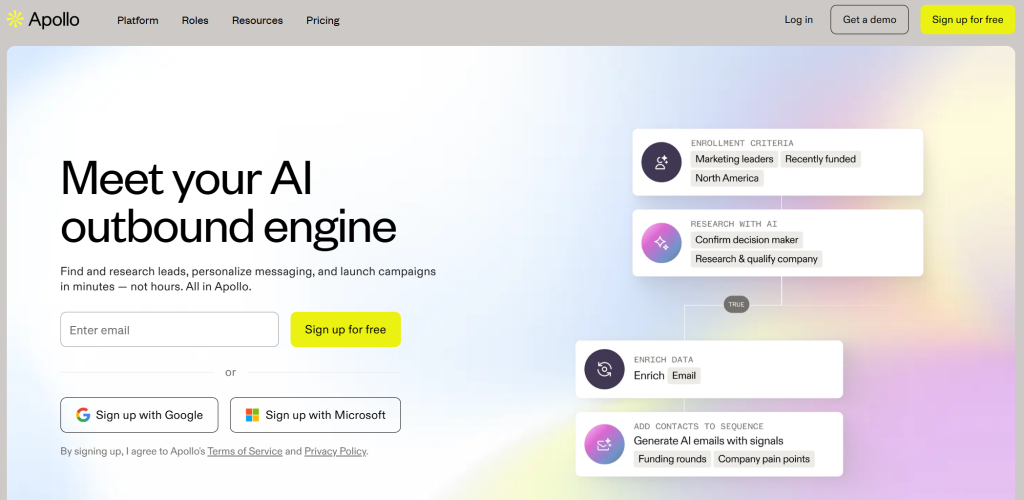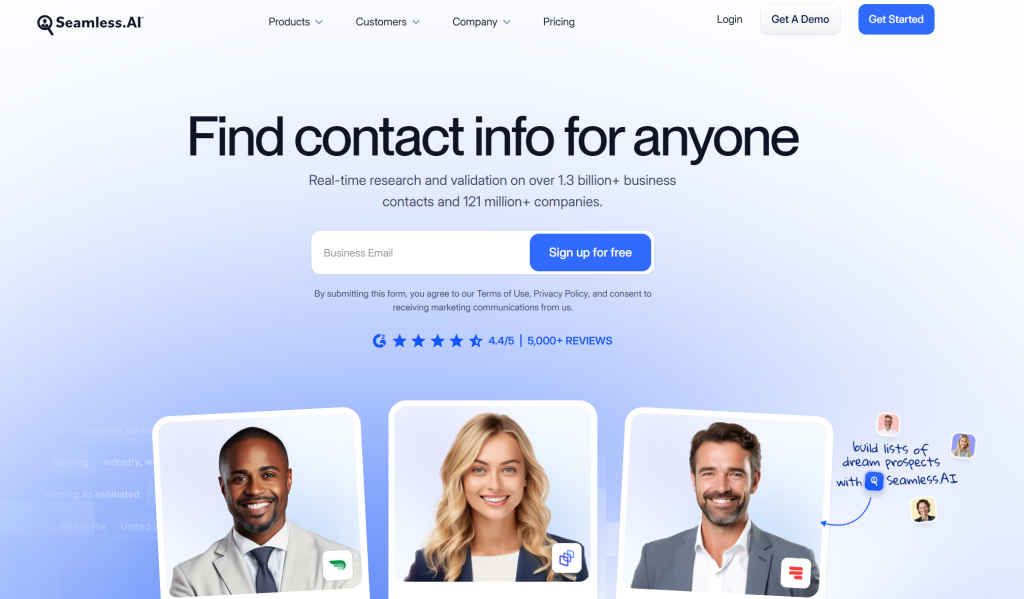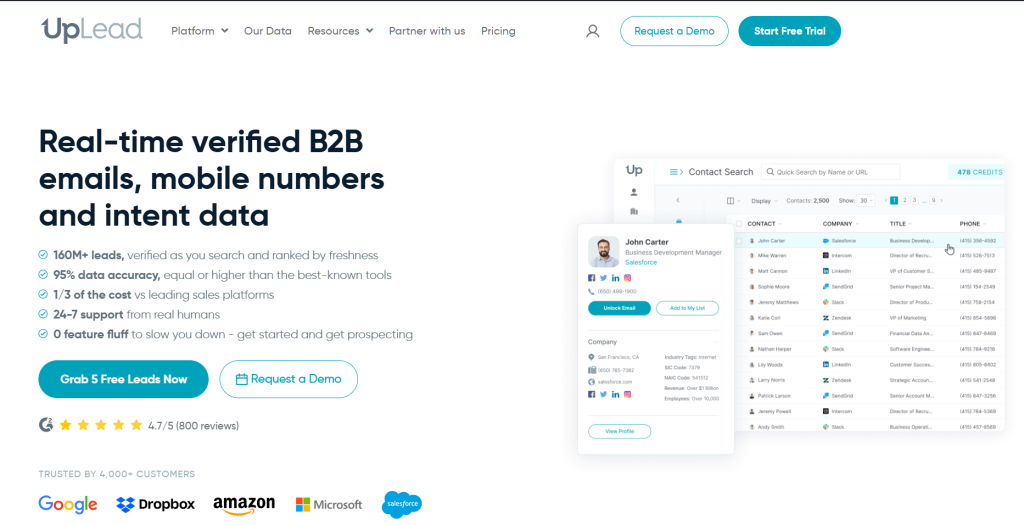When it comes to sales intelligence tools, Apollo.io and Seamless.ai are two of the top contenders. Are you battling inaccurate contact data that wastes SDR time, or do you need an all-in-one platform to consolidate your sales stack? Choosing between Apollo.io and Seamless.ai is a choice between two different philosophies. This analysis cuts through the marketing to reveal the true winner for data accuracy, total cost of ownership, and workflow integration.
Whether you need advanced analytics or AI-powered automation, this detailed comparison examines the three things that actually matter: verifiable data quality, hidden costs, and real-world integration capabilities. We’ll break down which platform solves your specific pain point while avoiding new ones.
Quick Comparison Table
| Feature | Apollo.io | Seamless.ai |
|---|---|---|
| Database Size | 275M+ contacts, 73M+ companies | 1.9B+ profiles, 121M+ companies |
| Data Accuracy Guarantee | Multi-step verification, no formal guarantee | Real time AI verification, no formal guarantee |
| Credit System Model | Hybrid: monthly per-user fee + usage credits | Credit-based: 1 credit per contact unlock |
| G2 Rating | 4.8/5 (9,100+ reviews) | 4.3/5 stars |
| Starting Price | $49/user/month (annual) | ~$147/month (250 credits) |
| Ideal User | All-in-one GTM teams, tech-savvy users | High-velocity prospectors, speed-focused |
What is Apollo.io?

Apollo.io is a comprehensive sales intelligence and engagement platform for prospecting, outreach, and revenue. Unique features include an extensive database, advanced search filters, email finder and call tools, multi-channel engagement sequences, and robust analytics. This platform integrates with major CRMs and email platforms and caters to organizations of all sizes looking to scale their sales efforts. Apollo.io aims to help sales teams find and qualify prospects more efficiently and manage the entire lead generation process from a unified platform.
What is Seamless.ai?

Seamless.AI is an AI-powered sales intelligence solution focused on real time lead generation and sales productivity. It provides a search engine to find and verify B2B contact info by crawling the web. Users can build targeted prospect email lists, integrate Seamless.ai with CRMs, and leverage company research tools like the Chrome extension for lead generation across websites. Key features include contact and email verification tools, list building, buyer intent data, and sales acceleration tools. Seamless.ai is well-suited for sales and marketing teams, recruiters, and marketers looking to increase efficiency and convert more prospects.
Plans & Pricing
Evaluating the available plans and pricing model is crucial when selecting a sales intelligence platform. Apollo and Seamless take different approaches to structuring and presenting pricing information to prospective customers.
Apollo
Apollo pricing provides clear transparency by outlining monthly and annual plan rates on its website. Users can easily view details around features, credits, and capabilities offered within each tier, from free plan to Organization levels, along with free trials.
- Free: $0, includes unlimited email credits, 100 mobile credits/month, 2,000 export credits/month
- Basic plan: $59 monthly or $49 annually per user, with 75 mobile credits/month, 1,000 export credits/month, 2,500 AI research credits/month
- Professional: $99 monthly or $79 annually per user, adds 100 mobile credits/month, 2,000 export credits/month, 10,000 AI research credits/month
- Organization: $149 monthly or $119 annually per user (minimum 3 users), includes 200 mobile credits/month, 4,000 export credits/month, 15,000 AI research credits/month
- Additional credits: $0.20 each with minimum purchase of 250 monthly or 2,500 annual credits
Seamless
Seamless takes a more customized approach, requiring direct contact for business plans instead of listing set rates online. Seamless pricing offers free trials and entry tiers before business-scale plans with premium support.
Based on user reports and available information, Seamless has four different pricing plan options:
- Free: $0, includes 50 lifetime credits
- Basic: Approximately $147/month for 250 monthly credits with free trial
- Pro: User reports range from $79-$99/user/month (minimum 5 users) for 1,000 daily credit refresh, up to $299/user/month for teams of 5+ users
- Enterprise: Custom pricing based on needs include premium integrations, priority support, and quarterly business reviews
Apollo offers clear pricing plans with transparent credit allocations, while Seamless requires custom quotes for business plans. Both feature free trials and entry-level plans for testing. Apollo’s incremental paid plans provide affordable pricing transparency upfront, while Seamless emphasizes tailored solutions. For standardized needs, Apollo’s self-serve tiers add clarity. Highly customized large-scale deployments may benefit from Seamless quotes.
What Are the Hidden Costs? A Deep Dive into Credit Systems and Renewal Policies
The true cost of sales intelligence platforms extends beyond monthly subscription fees. Credit systems, expiration policies, and auto-renewal terms can significantly impact your total cost of ownership.
Apollo’s Credit System Reality
Apollo uses a hybrid model combining monthly per-user fees with usage-based credits. Users find the credit system confusing, where different credit types (email, mobile, export) have separate, often restrictive limits that expire monthly. All unused credits expire at the end of the billing cycle, operating on a “use it or lose it” basis. Additional credits cost $0.20 each with minimum purchase quantities, and some users have noted that under certain fair use calculations, paid plans could appear to offer fewer email credits than the generous free plan.
Seamless’s Billing Practices
Seamless operates on a credit-based system where one credit unlocks a contact’s details. However, the Better Business Bureau website contains 57 complaints closed in the last 12 months regarding Seamless.AI’s auto-renewal charges without notice and refusal to issue refunds. All Seamless accounts are under annual contracts that auto-renew, requiring users to submit a non-renewal request at least 60 days before the contract renewal date. Users report being charged for renewals without prior notice, with Seamless often citing a 60-day written notice clause that users claim was not clearly communicated during signup.
Cost-Per-Valid-Email Analysis
Based on user reports of high data accuracy differences, Apollo’s cost-per-valid-email ranges from $0.05-$0.15 depending on plan tier and credit usage efficiency. Seamless’s cost-per-valid-email can range from $0.30-$1.20 per contact, but users report being charged a credit even when accurate data is not found or is inaccurate, significantly increasing the true cost.
Data Quality & Accuracy: Who Can You Trust?
A 20% bounce rate from inaccurate contact data isn’t just an inconvenience; it’s wasted SDR payroll and a risk to your domain’s reputation. Evaluating the scope, sources, and reliability of each platform’s data sources is crucial.
Apollo
As of late 2025, Apollo.io’s vast database contains over 275 million contacts and over 73 million companies. Apollo sources its data from crawling public websites and APIs, a contributor network where users share business contacts, direct integration with user CRMs and email systems, and partnerships with third-party data providers. They use a proprietary algorithm and a 7-step verification process to validate and clean the data, with fresh data refreshed instantly when a new signal like a job change is detected.
- Multi-step verification process ensures high quality data accuracy and reliability
- Contact details include emails, direct dials, and social profiles across 150+ industries globally
- Industry-specific searching allows targeted outreach by sector
- Transparent database scope and verification processes
Seamless
As of late 2025, Seamless.ai claims its real time search engine can access over 1.9 billion contacts/profiles, with 121 million+ researched companies. Seamless describes itself as a “real time search engine” rather than a static database. When a user searches for a contact, its AI-powered engine crawls the web in real-time to find and validate emails and phone numbers.
- Real time data crawler gathers data from multiple sources for freshness
- Contact information covers emails, phone number lists, titles, and company data
- Wide industry reach but can be narrowed with specific filters
- However, users frequently report high levels of outdated and inaccurate data, with some reviews mentioning 20-30% email bounce rates
Winner for out-of-the-box accuracy: Apollo (with caveats). Winner for real time data lookups: Seamless (with risks). Apollo touts a clearly larger verified database with transparency on verification processes. Both platforms take measures to maximize data quality, but user feedback suggests significant accuracy differences that impact deliverability and ROI.
Core Features Head-to-Head
Understanding the key features of each platform is essential for comparison:
Apollo
Apollo provides robust sales engagement tools for customized workflows:
- Advanced Search Filters: Over 40 specific filters for highly tailored searching by data attributes like industry, tech stack, and more
- Outreach Tools: Features like email templates, multi-channel sequences, and meeting scheduler optimize outreach efforts
- Sales Intelligence: Insights and recommendations powered by AI aim to enhance sales strategies
- Data Enrichment: Keeps contact data up to date by syncing with CRMs
- Analytics: Robust analytics provide visibility into prospecting and campaign performance
- Integrations: Connects with various CRMs, email platforms, and communication tools
- Compliance: GDPR compliant and SOC 2 / ISO 27001 certified for security standards
Seamless
Seamless focuses on automation, real time data, and flexibility:
- Powerful Search Functions: Continuously scans the web to find and verify the most up to date contact data
- List Building: Essential tools like Autopilot automate list creation based on target criteria
- Chrome Extension: Allows lead research and outreach directly from any webpage
- Buyer Intent Data: Identifies accounts demonstrating purchase intent signals
- Data Enrichment Capabilities: Keeps contact data accurate through ongoing enrichment
- CRM Integrations: Syncs with leading CRMs for seamless integration
- Writer: AI-powered tool helps craft compelling sales copy and messaging
- Flexible Plans: Options for individuals and teams, including free trial
A Seamless alternative, Apollo stands out for its highly customizable searching and advanced analytics that inform sales strategies. Seamless differentiates itself with real time data, list automation, and buyer intent identification. Both platforms aim to maximize sales productivity.
How Deeply Do They Integrate With Your Tech Stack?
Examining each platform’s integration capabilities and data enrichment capabilities is critical to understanding workflows. Integrations streamline data flows while enrichment keeps information current.
Apollo’s Integration Quality
Apollo connects with major customer profiling software and enriches CRM data. Its Salesforce integration is particularly noteworthy for unifying workflows.
- CRM Integrations: Salesforce, HubSpot, Pipedrive, Zoho, and more with bi-directional synchronization capabilities
- Email Integrations: Gmail, Outlook, MailChimp
- Communication Integrations (through API): LinkedIn, Facebook, Twitter
- Enriches CRM data by adding missing or outdated contact information
- API access offered for custom integrations and automation
- Noteworthy: The API on lower-tier plans is not designed for high-volume bulk data scraping, with the platform designed for smaller-scale operations
How CRM & API Integrations Actually Work
The quality of workflow integration matters more than quantity. Apollo offers bi-directional synchronization capabilities even on its free plan, meaning data flows both ways between Apollo and your CRM. While specific API rate limits for current paid plans aren’t detailed publicly, discussions suggest lower tiers can be restrictive for high-volume bulk data scraping.
Seamless’s integration is primarily a one-way push from Seamless to connected CRMs like Salesforce or HubSpot, checking for duplicates before importing but not designed to pull and update data from the CRM back into Seamless. The Chrome extension syncs browsing research into existing tools, and real time search API integration embeds latest data directly into systems.
- CRM Integrations: Salesforce, HubSpot, Microsoft Dynamics (one-way push)
- Email Integrations: Gmail, Outlook
- API Integration: For custom platforms and workflows
- Enriches data in CRM, marketing automation, ATS, and more
- Chrome extension syncs browsing research into existing tools
- Noteworthy: Real time search API integration embeds latest data
Both platforms focus on integrating with existing martech stacks via APIs and out-of-the-box connectors. Apollo’s deep bi-directional Salesforce integration and Seamless’ real time search API capabilities are prime choices for users wanting to enrich and automate workflows with accurate contact information.
Which Platform Is Better for Building Targeted Lists?
Apollo.io is better for users who want deep, granular control to build hyper-specific lists from scratch, while Seamless.ai is better for users who want AI to rapidly generate broad lists and suggest relevant contacts. Apollo provides a comprehensive suite of over 40 advanced filters, allowing users to build lists with surgical precision based on criteria like technologies used, recent job postings, funding stages, and intent data topics. In contrast, Seamless’s strength lies in its AI Autopilot, which can generate massive lists based on broader criteria almost instantly, and its real time search that validates data on the fly.
Apollo
Apollo offers a customizable approach:
- Customized searching utilizing advanced filters for ideal customer profile
- AI-powered engine recommends additional relevant sales leads
- Automated, personalized outreach sequences across email, phone, social
- Example: A user can filter by “HR managers” in “tech companies” in “California” and then engage via email sequences informed by sales intelligence insights or find out how to get a business phone number and engage in that channel
Seamless
Seamless leverages more AI-driven automation:
- Real time search engine continuously indexes the web to surface new leads
- AI recommends prospects based on observed user preferences and engagement patterns
- The autopilot feature builds targeted lists meeting defined criteria and verifies prospect data
- Example: A user can get AI-recommended leads for “CTOs in banking” and instantly build an associated list complete with verified information to start outreach
Apollo provides more customization in initial search parameters but an automated approach afterward. Seamless gives more control throughout sales processes to surface recommendations and build lists tailored to observed user patterns. Apollo may suit users who know their ICP, while Seamless caters to those seeking AI-driven prospect suggestions. Both platforms ultimately aim to generate quality leads.
Customer Support & Onboarding
Apollo’s power is a double-edged sword; without proper onboarding, it can become expensive shelf-ware your team avoids. Assessing the user interface and implementation process for each platform:
Apollo
Apollo emphasizes intuitive navigation and onboarding resources, though it presents a steep learning curve, particularly for non-technical users. G2 reviews note that “it takes a very technical person to put together your sequencing, workflows, and searching contacts properly.”
- Intuitive user interface simplifies navigation and usability
- Extensive onboarding resources provide implementation guidance
- The combination enables a quick learning curve for technical adopters
Seamless
Seamless focuses on seamless setup and clarity, but user feedback indicates poor customer service and support resources:
- User friendly interface prioritizes simplicity and clarity
- Designed for fast setup with minimal disruption
- Well-suited for users of all experience levels
- However, customer service issues and support resource limitations are frequently reported
In terms of user experience, Apollo and Seamless emphasize intuitive user interface design that allows new users to get up and running quickly. Seamless highlights its ability to implement seamlessly with minimal onboarding friction, but support quality concerns may impact long-term success. Apollo provides more extensive learning resources for adopters across experience levels. For the most straightforward quick start experience, Seamless may have an advantage, but Apollo offers better long-term support.
Security & Compliance
Evaluating security measures is essential for both small business and enterprise companies in a search for new platforms. Reviewing Apollo’s security provisions and compliance adherence:
Apollo
Apollo emphasizes security certifications:
- Robust security measures, including encryption and audits
- GDPR compliant and SOC 2 / ISO 27001 certified
- High standards for data privacy and user consent
Seamless
Seamless provides general assurances:
- Implements data encryption and protection protocols
- State’s compliance with GDPR and privacy regulations
- Focuses on protecting user data privacy
Both platforms have prioritized security and compliance, implementing standard measures like encryption alongside certifications and audits. Apollo provides more details on the extensive measures and certifications it has obtained. Seamless offers assurances but is less specific. Apollo appears to provide greater transparency for rigorous requirements.
Chrome Extension
Browser extensions can provide quick access to prospect data to enhance workflows. Below is a breakdown of how Apollo and Seamless extensions compare their focus and functionality.
Apollo
Apollo’s extension integrates tightly with popular platforms like LinkedIn and Gmail for workflow productivity. It also overlays contact data directly into web pages for quick access and offers a free version with email credits.
- LinkedIn Integration: Enhances existing tools with automation
- Overlays contact data on web pages for quick access
- Syncs Gmail and Calendar to simplify outreach tracking
- Free version available with email credits
Seamless
Seamless concentrates its extension on real time data lookups and CRM integration for up to date data. It also provides free credits to test out the capabilities.
- Real time data lookups from any website
- Right-click contact research and lead info access
- Syncs Chrome findings with CRM platforms like Salesforce
- Includes free credits to test capabilities
Both extensions provide quick access to essential data for lead research and outreach efforts. Apollo focuses on productivity with existing tools like LinkedIn and Gmail. Seamless concentrates on real time data lookups for emails and phone numbers. Those heavily using LinkedIn and Gmail may gain more from Apollo, while sales professionals wanting real time browsing capabilities can benefit from Seamless.
Apollo vs. Seamless Pros and Cons
Evaluating the key advantages and limitations of each sales intelligence platform provides an important perspective. Based on customer experiences, the main pros and cons for Apollo and Seamless are here.
Apollo.io Pros & Cons
Apollo offers robust capabilities but has faced some adoption challenges:
Pros
- Vast database of 275M+ contacts and 73M+ companies
- Advanced filters for targeted sales prospecting
- Robust automation sequences at scale
- Powerful analytics to inform sales strategies
Cons
- Users find the credit system confusing, where different credit types (email, mobile, export) have separate, often restrictive limits that expire monthly
- Some issues reported with deliverability
- Steep learning curve, particularly for non-technical users, with G2 reviews noting complexity in setup
- The API on lower-tier plans is not designed for high-volume bulk data scraping
Seamless.ai Pros & Cons
Seamless touts smart AI features but has room for improvement:
Pros
- Real time search continually indexes the latest data
- An intuitive user interface enables ease of use
- Chrome extension for lead generation
- Smart AI essential tools like Autopilot and buyer intent
Cons
- Data accuracy is a primary concern, with G2 reviews frequently citing inaccurate, outdated, or missing contact information and some users reporting 20-30% email bounce rates
- The Better Business Bureau contains 57 complaints closed in the last 12 months regarding auto-renewal charges without notice and refusal to issue refunds
- Poor customer service and support resources
- Users report being charged a credit even when accurate data is not found or is inaccurate
Final Verdict: Who Should Buy Apollo.io and Who Should Buy Seamless.ai?
When deciding between Apollo and Seamless, it’s crucial to focus on which platform aligns better with your needs and priorities. Here is a final analysis of vital reasons for choosing each solution.
Buy Apollo.io If
You are part of an all-in-one GTM team (startups, SMBs, and enterprise teams) that wants a single, unified engagement platform combining a large B2B database with a full suite of sales engagement and intelligence tools, and you’re comfortable with technology and want strong integration capabilities. For organizations needing to streamline sales processes to engage prospects at scale, Apollo’s segmentation tools, multi-channel automation, and robust analytics offer advantages. Companies with established workflows in platforms like Salesforce and Outlook can maximize those through Apollo’s deep integrations. Extensive databases and broad API capabilities provide the scope for enterprises to customize Apollo around their existing tools.
Buy Seamless.ai If
You are a high-velocity prospector (sales, marketing, recruiters) whose primary goal is to quickly find accurate contact information for a high volume of B2B prospects, and you prioritize speed and direct access to decision-makers, but be wary of data accuracy issues and billing practices. Businesses focused on having the most current lead data will appreciate Seamless’s real time search capabilities. The platform’s AI essential tools also save time by automating list creation and management based on buyer signals. For adopters who want technology to handle the heavy lifting of the lead generation process, Seamless’s automation strengths stand out, though customer service and billing transparency remain concerns.
Beyond Apollo and Seamless: A Look at the Wider Market
The comprehensive sales intelligence landscape extends beyond these two platforms. ZoomInfo targets enterprise and large sales and marketing teams, positioning itself as a comprehensive go-to-market intelligence and engagement platform with deep, robust datasets and predictive lead scoring, generally considered a premium, higher-cost solution. Cognism focuses on B2B sales and marketing teams with a strong focus on the European market, emphasizing accurate, compliant (GDPR & CCPA) international data, especially mobile numbers and direct dials. Lusha targets individual sales reps, recruiters, and SMBs, positioning itself for simplicity, speed, and ease of use with quick contact retrieval through a simple-to-use platform and browser extension, though user feedback shows mixed feedback on data quality.
When comparing Apollo and Seamless against these alternatives, Apollo competes well with ZoomInfo for mid-market companies seeking comprehensive features without enterprise pricing. Seamless positions against Lusha for speed and simplicity, though data accuracy concerns may favor Lusha. Cognism offers a compelling alternative for companies prioritizing European data compliance and mobile number accuracy.
The UpLead Advantage: Solving for Accuracy, Cost, and Usability

If you need robust data quality and customizable prospecting tools without the complexity of Apollo or the billing issues of Seamless, try UpLead. UpLead is the only company in its space to offer a 95% or higher data accuracy guarantee, achieved through a multi-step verification process that includes analyzing public data crawling, licensing data, using AI algorithms, and performing real time email verification at the moment of download. If your exported data falls below this 95% accuracy threshold, UpLead will refund the credits used for the inaccurate data.
UpLead delivers affordable pricing transparency with over 50 advanced filters to build highly targeted lead lists, including technographics (filter companies based on specific technologies they use), intent data (identify companies actively researching solutions), and granular contact and company filters. Direct integrations with popular CRMs like Salesforce, HubSpot, Zoho, Pipedrive, and Microsoft Dynamics 365 allow you to not only push new leads into a CRM but also enrich existing, incomplete CRM data in bulk.
Unlike Apollo’s confusing credit system or Seamless’s auto-renewal issues, UpLead operates on a straightforward model where one credit is used per contact or company record exported or unlocked, with clear terms and no hidden fees. Take advantage of today’s free trial to experience UpLead’s accurate and customizable platform first-hand.
FAQs About Apollo vs. Seamless
Below are some of the most frequently asked questions about Seamless.ai vs Apollo.io.
Apollo specializes in in-depth data and analytics for customized segmentation strategies with over 40 specific filters and bi-directional CRM sync. Seamless concentrates on automation and real time data to save time with AI-powered list building. Apollo suits sales teams with clearly defined ICPs who want comprehensive sales engagement tools, while Seamless offers more AI-suggested leads for high-velocity prospecting.
Apollo excels at advanced segmentation and analytics for all-in-one GTM teams comfortable with technology. Seamless is preferable for high-velocity prospectors who prioritize speed and real time data, but be aware of data accuracy issues and billing practices. The ideal solution depends on whether you need comprehensive sales engagement tools or specialized contact finding capabilities.
Apollo uses a confusing credit system where different credit types (email, mobile, export) have separate limits that expire monthly, with additional credits costing $0.20 each. Seamless operates under annual contracts that auto-renew, with 57 BBB complaints in the last 12 months regarding unauthorized billing and difficult cancellation processes requiring 60-day written notice.
What You Need to Remember About Apollo.io vs. Seamless.ai
When choosing between Apollo and Seamless, the key factors are your need for comprehensive sales engagement tools vs. specialized contact finding capabilities. Apollo provides robust segmentation, workflow integration, and analytics for established business plans looking to scale outreach through a unified platform. Seamless focuses on real time data and speed for high-velocity prospecting, but data accuracy and billing transparency remain significant concerns. Consider your team’s technical comfort level, budget for hidden costs like expiring credits or auto-renewals, and whether you need an all-in-one solution or specialized contact discovery tool.






